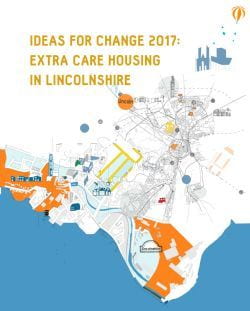Ideas for change: students focus on innovative housing designs for an ageing population
10 April 2017
Designs for housing that could help older people live longer and more comfortably in their local communities have been proposed by students from the University of Lincoln, UK, in a unique collaboration with regional specialist housing association, LACE Housing. The students were challenged with researching the housing needs of Lincolnshire’s ageing population and translating them […]

Designs for housing that could help older people live longer and more comfortably in their local communities have been proposed by students from the University of Lincoln, UK, in a unique collaboration with regional specialist housing association, LACE Housing.
The students were challenged with researching the housing needs of Lincolnshire’s ageing population and translating them into innovative design ideas for extra care housing –properties where older people can live in a home of their own, usually with additional on-site care, support and communal facilities.
They presented their ideas for change at a special event attended by Baroness Warwick, Chair of the National Housing Federation, on the University’s main Brayford Pool Campus today (Monday 10th April 2017).
Working with Dr Primali Paranagamage, from Lincoln’s School of Architecture and Design, five teams of students from the University’s schools of Architecture and Design, Business, and Health and Social Care took part in the project, which was sponsored by Lindum Group, Thornton & Firkin, Saunders Boston, and South Holland District Council in addition to the support of LACE Housing.
A major consideration throughout the project was the development of housing solutions that allow people to ‘age in place’, enabling them to remain part of their community, close to family and friends, resulting in better long-term health.
The ideas of all the groups were developed into a single report, ‘Ideas for Change 2017: Extra Care Housing in Lincolnshire’, produced by Dr Paranagamage, whose research explores housing, marginalised communities and social innovation.
Dr Paranagamage said: “As Lincolnshire’s ageing population continues to grow, a lack of appropriate housing stock and an increase in demand on the social care system becomes of greater concern. It is therefore of the upmost importance that creative solutions are sought to explore new models of housing and development in partnership with local health service providers.
“This project has been a terrific opportunity for the students involved, not only to engage in a real-world project and to collaborate with real external stakeholders, but to work within an interdisciplinary team as they will in their future careers.”
Nick Chambers, Chief Executive at LACE Housing, added: “We were delighted to receive Baroness Warwick and to have the opportunity to share with her our innovative approach to partnership working and the design and delivery of specialist housing and support services for older people in Lincolnshire.
“It was an honour to introduce the Baroness to the students of the University of Lincoln who have worked so hard on the report, which will no doubt have a large impact on what housing with care looks like in Lincolnshire in the future.”
Hoping to gain further insight into LACE Housing’s innovative approach to partnerships and research, Baroness Warwick’s visit also included an overview of the ENRICHME project (ENabling Robot and assisted living environment for Independent Care and Health Monitoring of the Elderly), another collaboration between LACE Housing and the University of Lincoln, through its School of Computer Science, which aims to develop and test the ability of robots to support ageing populations.
